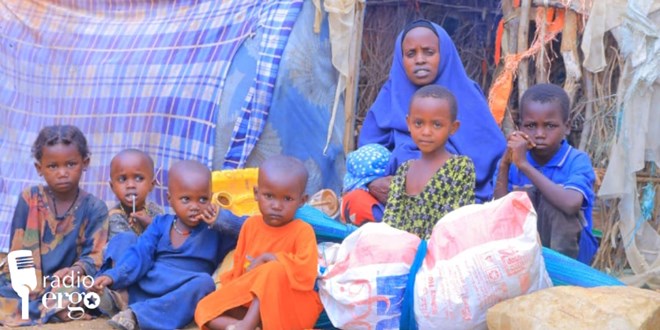
Wednesday July 16, 2025

IDP mother and her children find shelter in the camp/File Photo
Flash floods in Garowe, in northern Somalia’s Puntland state, have left around 800 families of farmers and internally displaced people struggling to recover.
After torrential rains on 13 June, Farah Abdi Shire lost 30 goats and all his crops of vegetables and grains on his three-hectare farm in Balley outside Garowe. The floods swept away their traditional Somali hut, household items, and food supplies.
advertisements
“We have no shelter now, we have become displaced people,” he told Radio Ergo. “All the property we had, including the farms, was washed away by the floods. And we have been isolated for a while now, with no way for aid to reach us.”Farah and his family are depending on whatever their neighbours can share from their own meals as they can’t cook without their utensils. Mosquitoes have proliferated due to water collecting in pools in the valley, causing them sleepless nights camped under a tree.
The floods also cut them off, making it difficult for people to reach them with any aid.
“Our situation is dire. The road we used to take to the town is cut off. The situation has become very hard, and what has happened is not something I can recover from unless I receive aid or assistance,” he said.
Farah, 40, has spent his entire life farming and herding. He invested about $2,000 in the farm, which he borrowed from traders in Garowe. He also owes about $600 for food he bought on credit for his goats during the last dry season when there was drought in the area. He had hoped to repay these debts this year and recover from the hardship of the drought when he sold his crops.
Farah believes it will be difficult for him to recover as his farm needs significant investment to repair the damage caused by the water, which destroyed fences and eroded a lot of soil, leaving deep gullies.
In Balley, a flood-prone area, nearly 100 farms were destroyed in the sudden flooding.
Additionally, around 500 families living in displaced camps around Garowe lost their huts, food and other belongings.
Ayuto Ali Foley has been sheltering her seven children on high ground since the floods that left them homeless. She lost 12 kilograms each of flour, rice and sugar that she had bought on credit for $30 two days earlier.
“I swear to God, we are suffering. We don’t even have food for the children; we are dependent on kind people for assistance. We are staying in a house belonging to people also affected by the floods, who also have nothing. The children get one meal a day with great difficulty. We don’t even have any cooking utensils,” she said.
Ayuto lost her husband two years ago from an unknown illness he had battled for a long time. Since then, has been trying to fill the gap left by his income from manual labour by doing laundry work for two to three dollars.
However, she can’t leave her young children alone in this situation so she hasn’t been able to go to town to find work.
“We used to go to the town to collect rubbish and do laundry for people. Now, we can’t even do that,” she said. “When you have a home, you have the will and motivation to go out and find something for the children. I don’t have the will to go outside now.”
Ayuto is also concerned about the education of her seven children, who were in grades five to seven at a school now closed due to the floods.
She described the situation as the worst she had experience since moving from conflict-stricken Bakool region 10 years ago to find safety and aid in the camps in Garowe.
An assessment conducted by the Puntland Ministry of Relief and Disaster Management stated that around 500 displaced families had been affected by the floods, while another 300 families of pastoralists and farmers had also been impacted.
The ministry’s coordinator in Nugal region, Abdihaqim Barre Nuh, stated that the damage caused by the rains was extensive and that the government alone could not address it. He said they were striving to secure international assistance.
“The ministry has issued its initial assessment and shared it with organisations. Now, we are waiting for further steps to be taken on how to help these people. The biggest burden has fallen on the IDP camps,” he said.